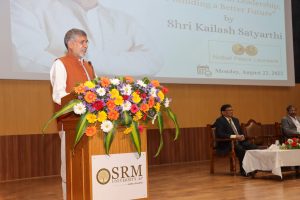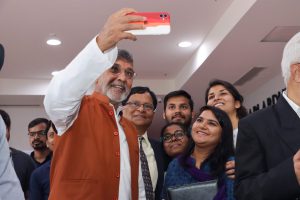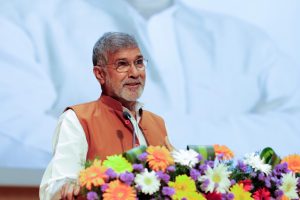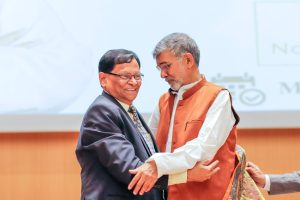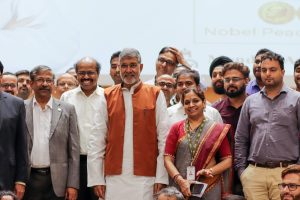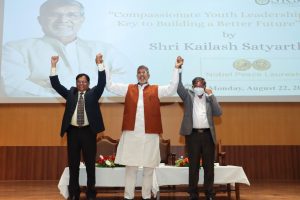All Management Events
- Dr Kamatham Narayanaswamy August 23, 2022
- Facial recognition system August 23, 2022
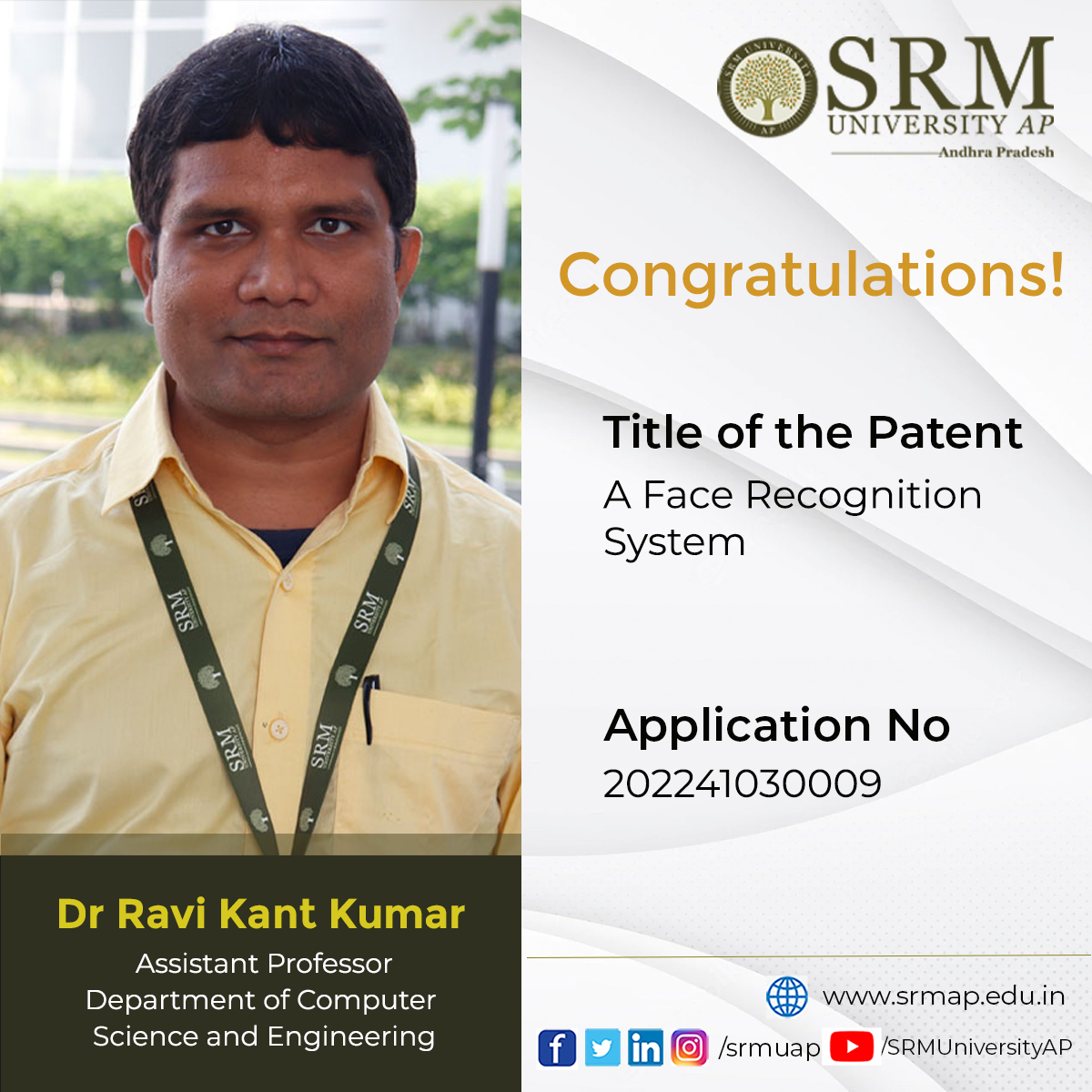 Assistant Professor Dr Ravi Kant Kumar of the Department of Computer Science and Engineering aspires to investigate and design the most effective face recognition system appropriate enough to recognise faces in various unconstraint environments. Recently, his patent application titled A Face Recognition System (Application number: 202241030009) got published. He collaborated with his BTech student Thota Venkata Saai Praneeth, for this project. Facial recognition systems have abundant applications in Face Identification, Automobile Security, Access Control, Immigration, Education, Retail, Healthcare, Image database investigations, Surveillance, and many more.
Assistant Professor Dr Ravi Kant Kumar of the Department of Computer Science and Engineering aspires to investigate and design the most effective face recognition system appropriate enough to recognise faces in various unconstraint environments. Recently, his patent application titled A Face Recognition System (Application number: 202241030009) got published. He collaborated with his BTech student Thota Venkata Saai Praneeth, for this project. Facial recognition systems have abundant applications in Face Identification, Automobile Security, Access Control, Immigration, Education, Retail, Healthcare, Image database investigations, Surveillance, and many more.Abstract
A facial recognition system is used for matching a human face captured in an image or a video frame with a database of faces. The system generally authenticates users by measuring facial features from the stored images. The present disclosure relates to face recognition systems. The envisaged system comprises a repository comprising a set of facial images of a plurality of subjects, a set of threshold values, and a plurality of rules. The system further comprises an image capturing unit for capturing a plurality of images of a subject’s face. A segmentation unit divides each image into a plurality of frames. The system further comprises a classifier that receives the frames and classifies frames containing faces from frames containing non-faces from the other frames. The facial features of each frame are extracted by an extractor. An analyser receives the extracted facial features and computes eigenvector values of the facial features of the frame. A comparator compares the computed eigenvector values with threshold values using the comparison rules to identify the subject.
Explanation of the research
Conventional facial recognition systems are configured to identify the contours of a person’s image captured by a camera or in real-time and compare it with the stored image to identify the person. However, external factors such as position, light conditions, camera calibration, and unconstraint conditions, among others, affect the identification of the face of the subject. Hence, comparing the faces with the help of the contours is not reliable. The present disclosure envisages a face recognition system. The system comprises a repository, an image capturing unit, a segmentation unit, a classifier, an extractor, an analyser, and a comparator. The repository consists of a set of facial images of a plurality of subjects, wherein the images define the subject’s facial features in different facial poses. Each image is tagged with an identity, a threshold integral value, and threshold eigenvector values corresponding to the facial features. The repository further comprises a first set of deep learning rules for classifying frames of a captured image into frames containing faces and frames containing non-faces, a set of extraction rules for extracting facial features from the frames 20 containing faces, the second set of deep learning rules for extracting eigenvector values of facial features of the frames containing faces. The repository additionally comprises a set of comparison rules for comparing eigenvector values of the captured facial features with the stored threshold eigenvector values to identify a subject’s face in the captured image.
- SRM AP to ink an MoU with the Rennes School of Business August 22, 2022
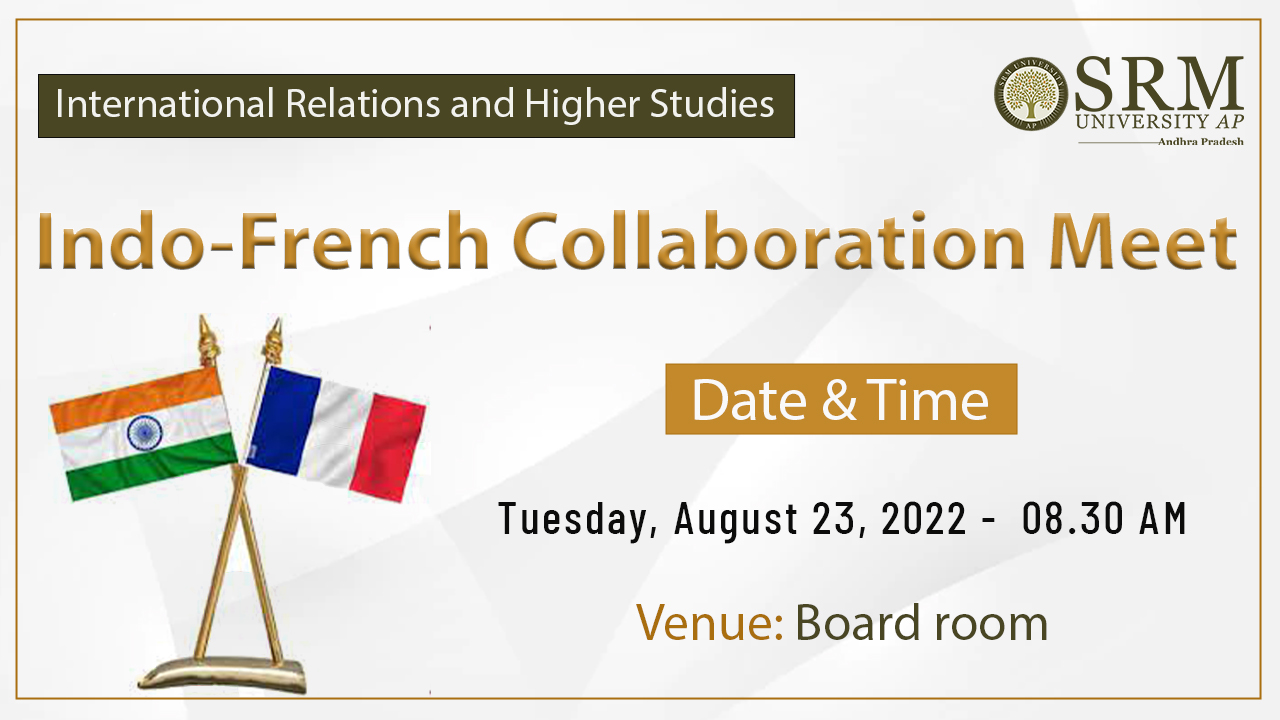 The diplomatic relations between India and France have been prevalent, and cooperation has developed in all major areas, including science and technology. Delegate visits are excellent opportunities to strengthen international partnerships and promote the mission of an educational institution. The Office of International Relations and Higher Studies is all set to host the Indo-French Collaboration Meet for inking an MoU with the Rennes School of Business.
The diplomatic relations between India and France have been prevalent, and cooperation has developed in all major areas, including science and technology. Delegate visits are excellent opportunities to strengthen international partnerships and promote the mission of an educational institution. The Office of International Relations and Higher Studies is all set to host the Indo-French Collaboration Meet for inking an MoU with the Rennes School of Business.Date: August 23, 2022
Time: 08.30 AM to 10.30 AM
Venue: Board room
The ceremony aims to to sign the Student Exchange Agreement. The visiting delegates are Dr Thomas Froehlicher, Dean, Rennes School of Business, and Ms Maud LE BARS, South Asia Area Manager Rennes School of Business. A meeting with Pro-Vice-chancellor Prof D Narayana Rao and the team will be held after an opening remark by the Hon’ble Vice Chancellor Prof V S Rao. There will be discussions regarding the collaboration and the road map ahead. Registrar Dr R Premkumar, DEAN of SEAMS Dr Bharadwaj, and Associate Director of IR&HS Dr Naga Swetha Pasupuleti will also grace the occasion with their august presence.
Continue reading → - You are the real heroes: Nobel Laureate Kailash Satyarthi to SRM AP students August 22, 2022
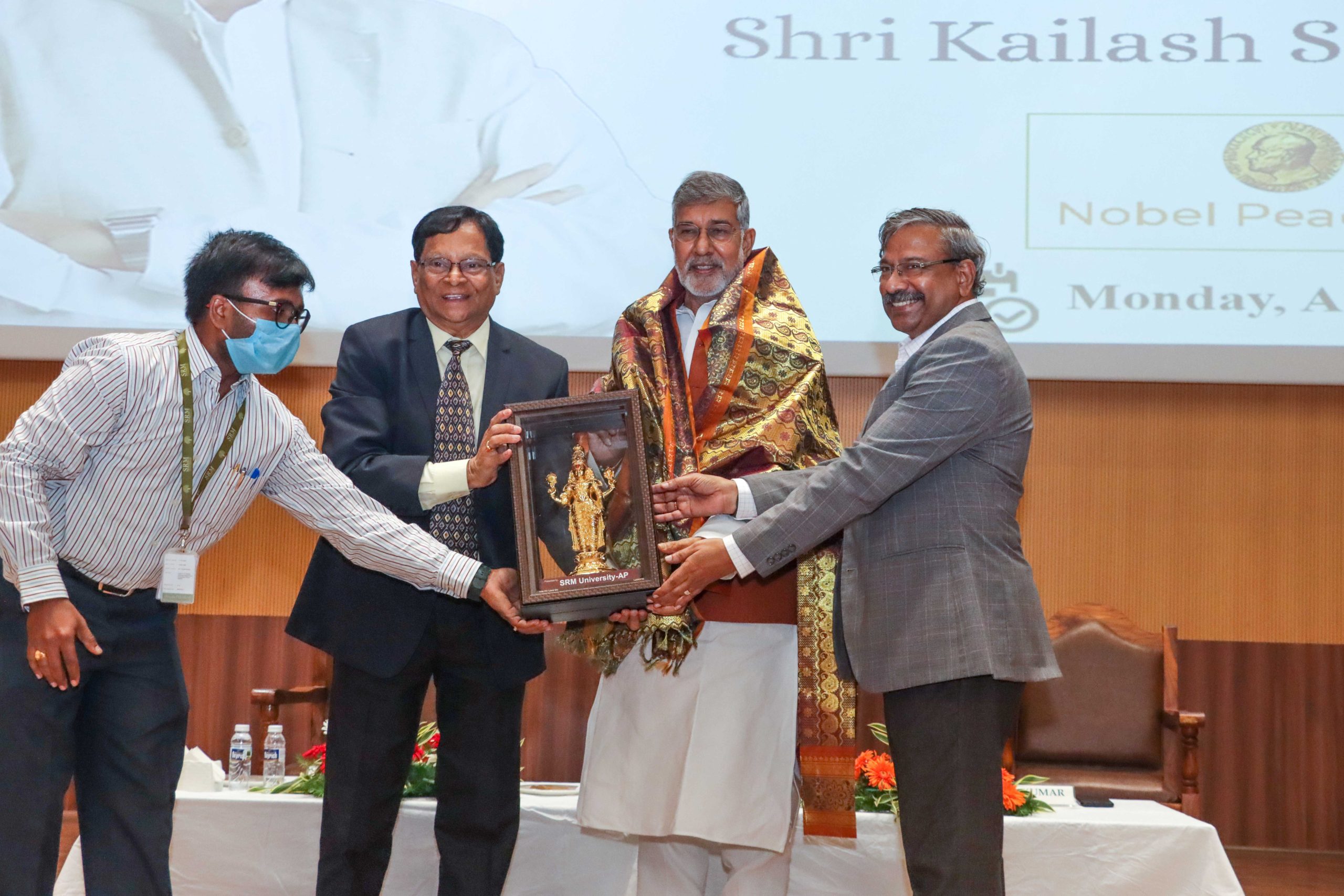 Nobel Peace Laureate Kailash Satyarthi addressed the students of SRM University-AP on the topic “Compassionate Youth Leadership: Key to Building a Better Future” on Monday, August 22, 2022. Vice-Chancellor Prof V S Rao, Registrar Dr R Premkumar, and other university dignitaries graced the occasion.
Nobel Peace Laureate Kailash Satyarthi addressed the students of SRM University-AP on the topic “Compassionate Youth Leadership: Key to Building a Better Future” on Monday, August 22, 2022. Vice-Chancellor Prof V S Rao, Registrar Dr R Premkumar, and other university dignitaries graced the occasion.“India may be a land of thousand problems, but India is also a mother of billion solutions; you are the solution, the real heroes, and the true makers of a new India”, said Shri Satyarthi, encouraging the students of SRM AP. He highlighted the significance of freedom and education in every child’s life and urged students to use their privilege of education to make this world a better place. Shri Kailash Satyarthi further called for the larger society of India to be the voice of several thousand children who have become the victims of child exploitation. The compassionate youth can work towards eliminating child slavery and make India a safe haven for every child.
“It is an honour and privilege to have with us one of the greatest thought leaders of our times, whose ideals and actions are revered and respected all over the world”, said Vice-Chancellor Prof V S Rao welcoming the honourable guest. He further emphasised the university’s vision to disseminate transformative education and enable its students to be conscientious citizens who can play an instrumental role in nation-building.
Shri Satyarthi acknowledged the contributions of SRM educational institutions toward moulding knowledgeable and passionate youth. Beyond its quality of education, he also admired the university for diffusing the values of humanity and compassion among the student community. He further recounted the story of children he rescued who pursued their education in SRM educational institutes. Shri Satyarthi reinstated the power of compassion in transforming the individual into a change maker and the need for education to ignite the spirit of compassion in every student’s mind. The renowned child rights activist who has been pivotal in the rescue of over 1 lakh children from forced labour and slavery is reckoned the world over for spearheading Bachpan Bachao Andolan, Kailash Satyarthi Children’s Foundation, Global March Against Child Labour, 100 Million Campaign and several other initiatives to fight against the injustices perpetrated against children worldwide and advocated for the universal right of Children’s education.
An interactive session was organised following the event where the students and faculty had a brief dialogue with the Nobel Laureate. Registrar Dr R Premkumar proposed the vote of thanks on behalf of the university to Shri Kailash Satyarthi for accepting the invitation and visiting SRM University-AP.
In Media: Press Coverage Continue reading → - Systematic bibliographic research on eutrophic-ecological models August 22, 2022

The Department of Civil Engineering is delighted to announce that Dr Siddhant Dash has published a paper titled “Systematic bibliographic research on eutrophication-based ecological modelling of aquatic ecosystems through the lens of science mapping” in the journal “Ecological Modelling” having an Impact Factor of 3.512. This research was conducted in collaboration with Prof Ajay S Kalamdhad from IIT Guwahati.

This research is a systematic approach on reviewing the published literature on eutrophic-ecological models developed worldwide and the methods associated with them. This provides critical insights into the status of the research domain, thereby providing a direction for the practising and future researchers to undertake a research career in this domain. It offers a more comprehensive and holistic approach to the critical review of the published literature, providing a deeper understanding to the researchers regarding the existing practices of developing eutrophication-based ecological models and the prospects lying ahead. His future research plans include understanding carbon and nutrient dynamics within an aquatic ecosystem.
Abstract of the Research
When water bodies receive surplus nutrients, especially nitrates and phosphates, these nutrients stimulate excessive plant growth (eutrophication), including harmful algal blooms, leading to oxygen depletion, decreased biodiversity, changes in species composition and dominance, and degradation of water quality. Although there are natural causes, much of the eutrophication today results from inadequately treated wastewater and agricultural runoffs. Population pressure, urbanization and industrialization contribute a considerable amount of waste, which alters the physio-chemical quality of water that eventually upsets the biotic components of the aquatic system. It is important to note that though pollution has been a significant factor in degrading the quality of aquatic ecosystems, the lack of management and global awareness regarding the protection and conservation of water bodies worldwide cannot be neglected. Hence, there lies an inherent sense of responsibility to restore the aquatic ecosystems to their natural state. Numerous techniques/treatment options are available for varying conditions, such as climatic factors, socio-economic factors, and so on. However, before ascertaining a treatment alternative to curb eutrophication levels, understanding the dynamics of any independent aquatic ecosystem is of prime importance. This necessitates a reliable model, which can provide information regarding the physical processes and dynamic occurrences in the eutrophic water bodies. Ecological modelling refers to the formation of dynamic and complex relationships between the organisms found in the ecosystem and the surrounding. It attempts to unravel the effects of certain relationships in the ecosystem that are not so apparent at first glance. The present study provides a scientific investigation of a detailed review of the published works in the domain of eutrophication-based ecological modelling till the year 2020. The first step was the scientometric studies, which were followed by a qualitative assessment wherein the current trends in research were discussed. This was followed by identifying the critical gaps in research to provide future direction.
Fig. 1. Ecological modelling process
Fig. 2. Description of the three-step literature review process employed in this research
Continue reading → - Effect of grass clippings on anaerobic co-digestion of food waste August 22, 2022
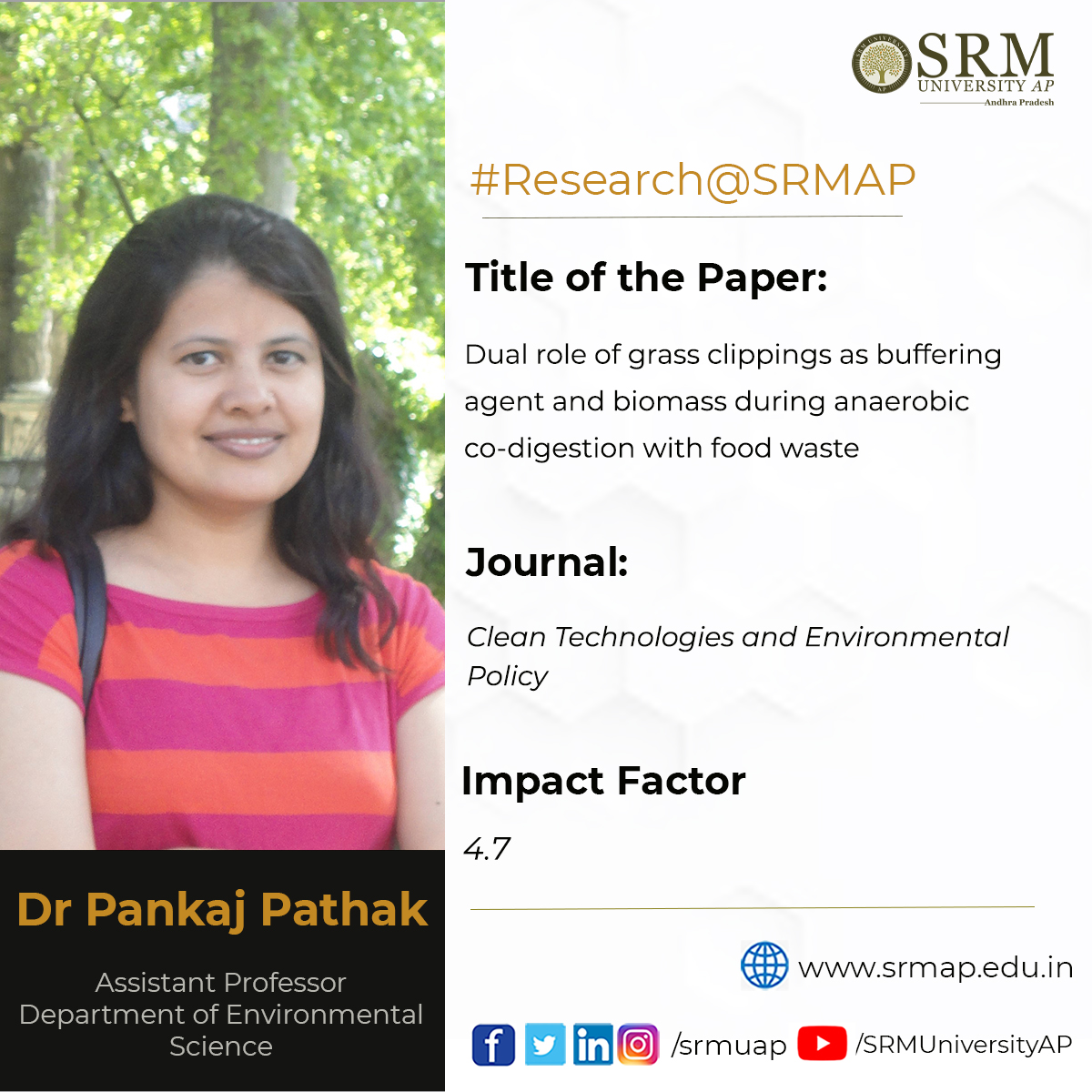 The different dimensions of sustainable waste management have always been explored by researchers all over the world. Assistant Professor Dr Pankaj Pathak, Department of Environmental Science, has been actively involved in this research area for a while. Her paper titled Dual role of grass clippings as buffering agent and biomass during anaerobic co digestion with food waste is published in the journal Clean Technologies and Environmental Policy with an impact factor 4.7. Dr Pankaj Pathak co-authored the paper with Debkumar Chakraborty, Sankar Ganesh Palani, M M Ghangrekar, and N Anand.
The different dimensions of sustainable waste management have always been explored by researchers all over the world. Assistant Professor Dr Pankaj Pathak, Department of Environmental Science, has been actively involved in this research area for a while. Her paper titled Dual role of grass clippings as buffering agent and biomass during anaerobic co digestion with food waste is published in the journal Clean Technologies and Environmental Policy with an impact factor 4.7. Dr Pankaj Pathak co-authored the paper with Debkumar Chakraborty, Sankar Ganesh Palani, M M Ghangrekar, and N Anand.Abstract
There is a dire need to replace the chemical buffers that regulate the redox environment in single-stage anaerobic digestion of food waste. Hence, the applicability of grass clippings as an eco-friendly buffering agent and biomass during the anaerobic co-digestion of food waste was explored. A focus was primarily given on the effects of grass clippings on the redox environment and acidogenesis. Concomitantly the production of volatile fatty acids, hydrogen, and methane in mesophilic conditions was monitored. Organic load and substrate-to-inoculum ratio were kept constant in all the experiments, and no chemical buffer was used. The results revealed that the redox environment was regulated with 10% grass clippings by inhibiting rapid pH drop in the digester. The addition of 2, 4, and 6% grass clippings promoted acidogenesis with increased production of acetic and butyric acids, whereas 8 and 10% grass clippings promoted solventogenesis with ethyl alcohol production. Hydrogen generation from the experiments with grass clippings was in the range of 27–30% of the total biogas, which was marginally higher than the control (25%). Methane concentration was negligible in the biogas generated from all experiments. The acidification rate, VFA production/consumption rate, specific hydrogen yield, hydrogen conversion efficiency, and volatile solids removal were maximum and minimum in the reactors with 6 and 10% grass clippings, respectively. From the above results, it can be concluded that adding grass clippings to food waste would regulate the sudden pH changes and enhance the production of value-added biochemicals, making the process cost-effective.
Continue reading → - The prospects and challenges in India-ASEAN relations August 22, 2022
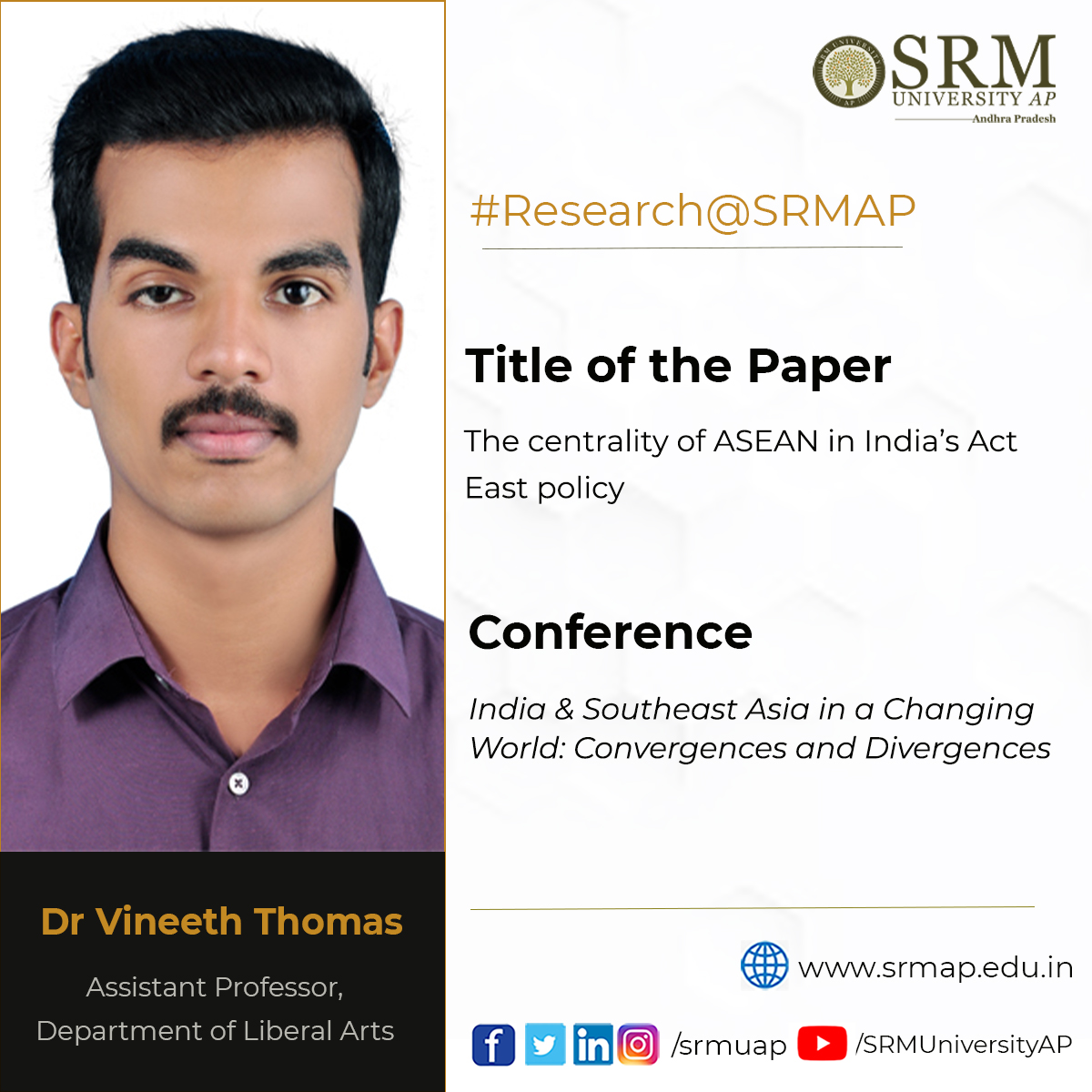 The upcoming international conference, India & Southeast Asia in a Changing World: Convergences and Divergences, will examine India’s Act East policy, investigating its prospects and challenges in the Southeast Asian region. Assistant Professor Dr Vineeth Thomas from the Department of Liberal Arts has been selected for presenting a paper at this Conference organised by Christ University, Delhi NCR. He will present the paper titled The centrality of ASEAN in India’s Act East policy at the conference.
The upcoming international conference, India & Southeast Asia in a Changing World: Convergences and Divergences, will examine India’s Act East policy, investigating its prospects and challenges in the Southeast Asian region. Assistant Professor Dr Vineeth Thomas from the Department of Liberal Arts has been selected for presenting a paper at this Conference organised by Christ University, Delhi NCR. He will present the paper titled The centrality of ASEAN in India’s Act East policy at the conference.The international conference will be held In-Person from 14 to 15 October 2022 at the CHRIST (Deemed to be University) Delhi-NCR campus. The Hanns Seidel Foundation funds this conference. The major focus area of the conference is India’s foreign policy towards ASEAN countries like Myanmar, Thailand, Malaysia, Vietnam, Indonesia, and Singapore
Abstract
Against the backdrop of multi-dimensional developments and interventions in the Indo-Pacific region, India’s overseas policy and national security apprehensions have undergone substantial changes in the past few decades. Starting with the Look East Policy in the 1990s, India advanced its policy in 2014 as Act East Policy. The potential benefits of bilateral and multilateral relations in the Indo-pacific region made India take up its partnership with the Association of Southeast Asian Nations (ASEAN) seriously, which provided an opening and strip for India to explore Southeast Asia. This paper evaluates the significance of keeping ASEAN at the heart of India’s Act East Policy by illustrating the prospects and challenges in India-ASEAN relations.
Continue reading → - Dr Manish Kumar August 18, 2022
- PhD scholars attended the INUP-i2i Familiarisation Workshop at IIT Kharagpur August 18, 2022
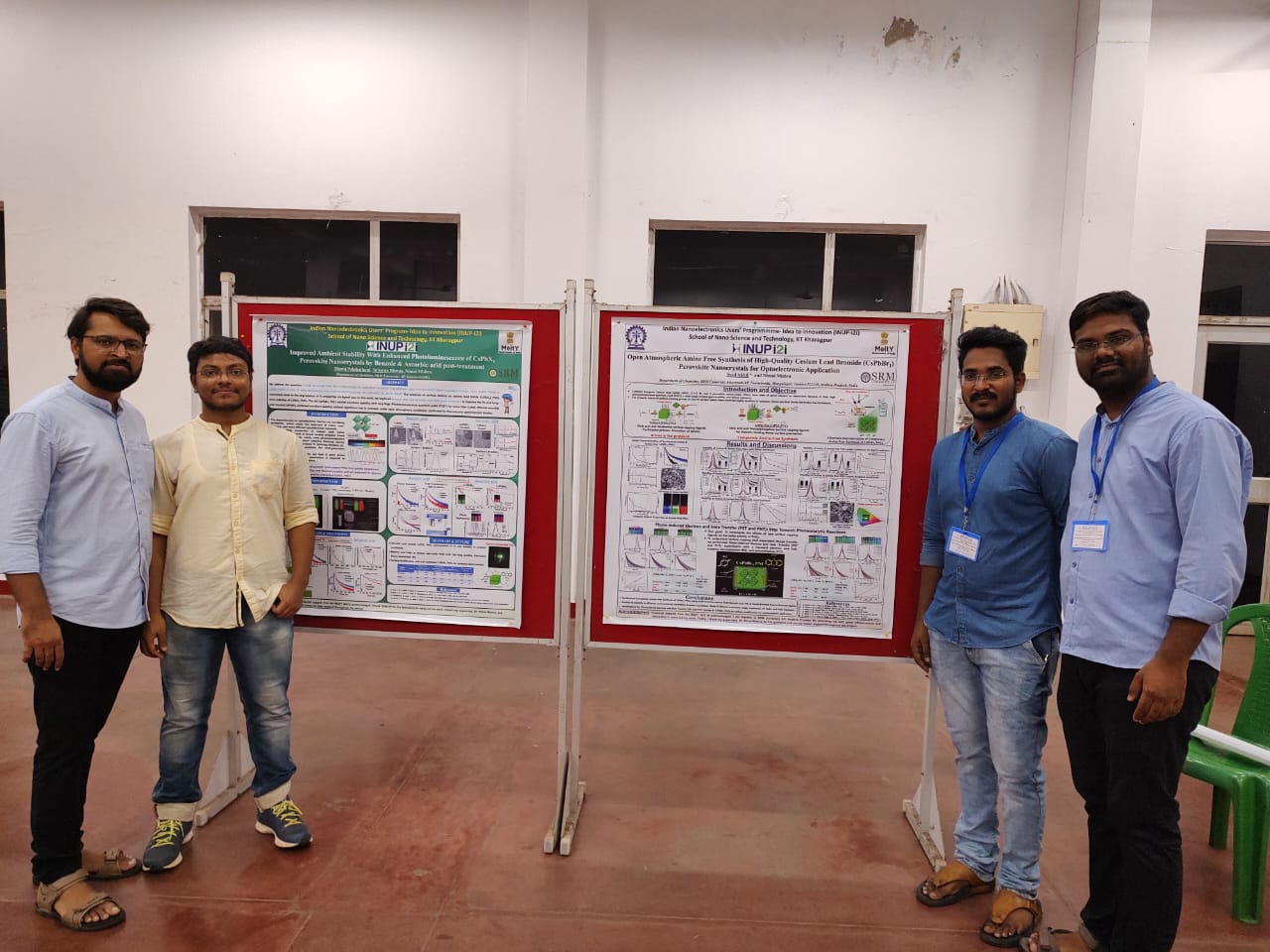 The Ministry of Electronics and Information Technology (MeitY) established the Indian Nanoelectronics User’s Programme (INUP) about a decade ago with the intention of improving skilled manpower in the areas of micro and nanoelectronics. This has laid the necessary foundation for the next step of the programme, INUP-i2i. It is a matter of pride that four PhD students from the Department of Chemistry attended the INUP-i2i Familiarisation Workshop on Nanofabrication and characterisations held from August 10 to 12, 2022, at IIT Kharagpur. Mr Syed Akhil, Mr Rahul SIngh, Mr Manoj Palabathuni, and Mr Subarna Biswas are the scholars who have grabbed this incredible opportunity.
The Ministry of Electronics and Information Technology (MeitY) established the Indian Nanoelectronics User’s Programme (INUP) about a decade ago with the intention of improving skilled manpower in the areas of micro and nanoelectronics. This has laid the necessary foundation for the next step of the programme, INUP-i2i. It is a matter of pride that four PhD students from the Department of Chemistry attended the INUP-i2i Familiarisation Workshop on Nanofabrication and characterisations held from August 10 to 12, 2022, at IIT Kharagpur. Mr Syed Akhil, Mr Rahul SIngh, Mr Manoj Palabathuni, and Mr Subarna Biswas are the scholars who have grabbed this incredible opportunity.Indian Nanoelectronics User’s Programme- Idea to Innovation (INUP-i2i) is developed to facilitate and support the generation of expertise in Nanoelectronics through participation and utilisation of the facilities at Nano-centres at IISc Bangalore, IIT Bombay, IIT Delhi, IIT Kharagpur, IIT Madras, and IIT Guwahati.
INUP will provide easy access to state-of-the-art nanofabrication and characterisation facilities to researchers, thereby creating a critical mass of hands-on experimental researchers across the country. This workshop is being organised both for familiarisation and interaction of the participants with faculty members of IITKGP. INUP has provided the accommodation and food for these shortlisted students. At the end of the workshop, they presented a poster as well.
Continue reading → - Shri Kailash Satyarthi to visit SRM University-AP August 18, 2022
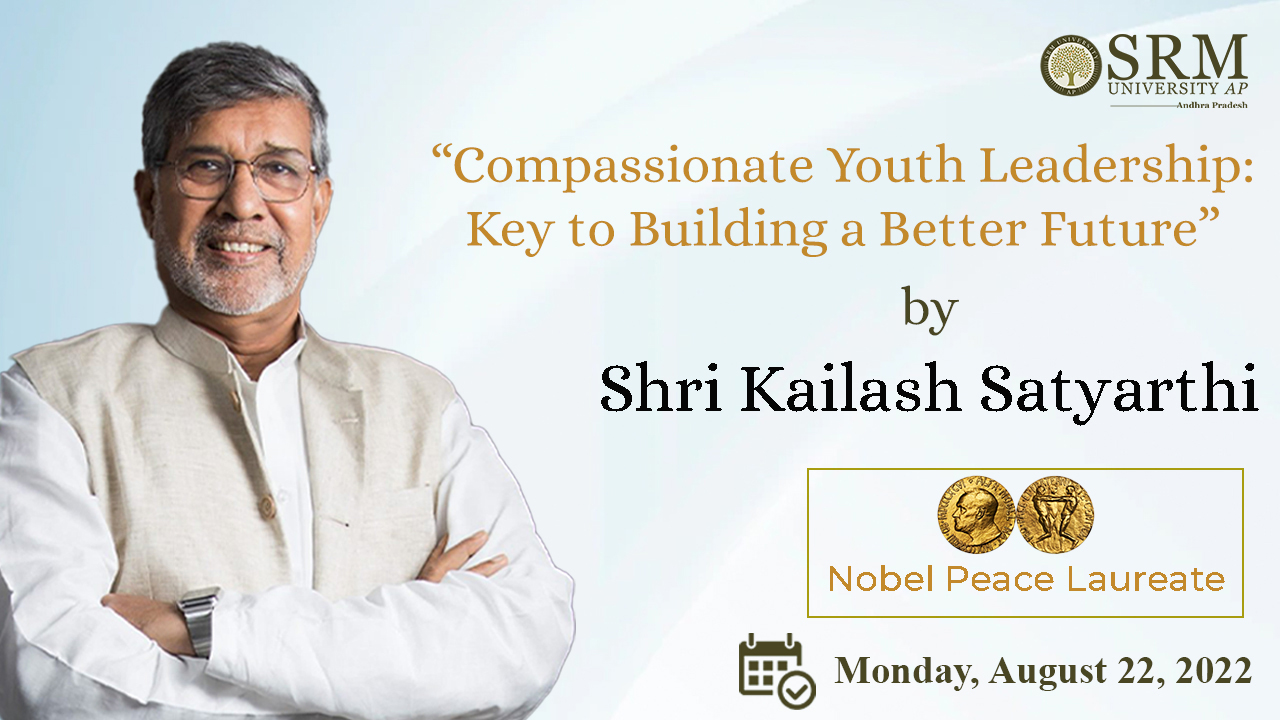 Indian Nobel Peace Laureate and the internationally acclaimed child rights activist Shri Kailash Satyarthi will address the students and faculty of SRM University-AP on August 22, 2022. His talk is scheduled on the topic “Compassionate Youth Leadership: Key to Building a Better Future”. Shri Satyarthi will confer with the students on the necessity of fostering compassion and empathy among the youth of the nation to lead the country towards a more humane future.
Indian Nobel Peace Laureate and the internationally acclaimed child rights activist Shri Kailash Satyarthi will address the students and faculty of SRM University-AP on August 22, 2022. His talk is scheduled on the topic “Compassionate Youth Leadership: Key to Building a Better Future”. Shri Satyarthi will confer with the students on the necessity of fostering compassion and empathy among the youth of the nation to lead the country towards a more humane future.Shri Kailash Satyarthi, who was the co-recipient of the 2014 Nobel Peace Prize with Pakistani activist Malala Yousafzai, has been driving global wide anti-child-slavery campaigns and advocating the universal right to children’s education for over four decades. He has rescued more than 110,000 children from the plight of child labour, child trafficking, and other forms of exploitation through his organisation Bachpan Bachao Andolan, or Save the Childhood Movement.
In 2016, he launched the 100 million campaign, a movement to inspire and mobilise young people to campaign for the rights of the world’s most excluded children. The movement intends to end violence against children, eradicate child labour, and ensure education, breaking the cycles of illiteracy, poverty, and violence for good. For more details, visit 100million.org. He is also the founder of multiple social activist organisations, including Global March Against Child Labour, Global Campaign for Education, Kailash Satyarthi Children’s Foundation, Laureates and Leaders for Children, etc.
Honourable Vice-Chancellor Prof VS Rao, Registrar Dr R Premkumar, and other university dignitaries will also take part in the programme. Prof VS Rao will deliver the welcome address and introduce the chief guest. Following the address of the chief guest, an interactive segment with the faculty and students has also been scheduled.


